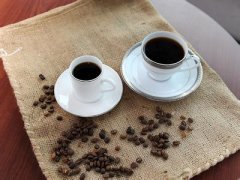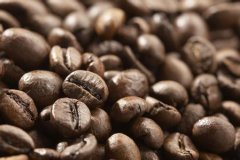Coffee brewing technology to share the process of grinding coffee beans

The roasted coffee beans
The operation of grinding into powder is called crushing.
The props used to grind coffee beans are called grinders.
It is said that Beethoven put 60 coffee beans into the grinder every morning.
Grind and then brew coffee
While grinding coffee, grinding coffee beans.
While enjoying its fragrance
And then experience the fun excitedly.
According to its size, the grinding methods of coffee beans can be divided into three types: rough grinding, medium grinding and fine grinding. Use the appropriate grinding method according to the coffee utensils.
There is also medium fine grinding or very fine grinding (powdered coffee powder) which is finer than fine grinding. The timing of grinding coffee beans is before brewing coffee, only the need for grinding is the top grade. After the coffee bean is ground into powder, its surface area increases and absorbs moisture, which is easy to oxidize. In short, with the passage of time, coffee powder also plays a role of deterioration to damage the flavor. And after the ground coffee beans are placed, the carbon dioxide retained inside the beans will be lost together with the aroma. In this way, when the coffee powder is extracted and filtered, the coffee powder should be expanded without expansion, and you can't make delicious coffee anyway. The secret is to consider grinding and homework consistently, so brewing coffee is the most delicious and mellow.
Fine grind
◎ fine grinding (fine particles, the same size as sugar)
Medium grind
Grinding in ◎ (particles the same size as a mixture of granulated sugar and coarse white sugar)
Regular grind grind coffee beans
◎ rough grinding (coarse particles, the same size as coarse sugar)
The knack of grinding coffee beans
The grinding prop for coffee beans is a grinder. There are numerous types of mills ranging from manual at home to large electric ones for business. Household grinders can also be used as decorations, and the number of people need more than one grinding, or electric to facilitate.
According to the structure of the grinder, there are grinders that use vertical and horizontal groove blades to cut coffee beans and those that grind coffee with molars. Each has its own advantages, and the situation of business use tends to mass production of the electric type as the mainstream.
However, the following two points should be paid most attention to when grinding coffee beans:
The friction heat of ① is suppressed to a minimum. (the aroma will fly away because of the fever)
Whether the size of ② particles is uniform or not. (if the particles are uneven, the concentration will be uneven.)
Taking this as a consideration, if you are a household mill, you should rotate it gently and take care to avoid friction heat as much as possible. Therefore, it is more appropriate to use electric grinders.
How to use the mill
Grind the beans before brewing.
There are two types of household mills: manual and electric. The manual type is used if the number is small, while the electric type is more convenient for the large number of people.
Determine the grinding method (particle size) with the bubbling apparatus.
Manual grinders should be careful not to produce friction heat only. And pay attention to whether it is mixed with other things.
Whether the granules of ground coffee beans are large and neat or not should be checked. (in the case of uneven particles, it is possible that the function of the grinder is always, or coffee roasting is not symmetrical, etc.)
Important Notice :
前街咖啡 FrontStreet Coffee has moved to new addredd:
FrontStreet Coffee Address: 315,Donghua East Road,GuangZhou
Tel:020 38364473
- Prev

Main producing areas and characteristics of high-quality coffee beans
The main producing areas and the characteristics of strict selection of beans at present, due to the wide variety of imported coffee beans from all over the world, it is impossible to choose. Here, we will introduce the main producing areas and the characteristics of coffee beans as a reference for you to choose and buy coffee. The main producing area of coffee and the characteristics of strict selection of beans * Brazil (South America) is the world's number one coffee producer and exporter. Due to its distribution in all parts of the country
- Next

Baking knowledge of boutique coffee beans roasting process
The Americans like shallow baking, while the British love deep baking. In the baking world, there is no unimpeded passport. Through the burning of the fire, release the aroma of coffee, sprinkle the personality of each fruit-- sour, sweet, bitter, incisively and vividly, from the tasteless raw beans to the mellow aftertaste in the cup-- baking, it is the long journey of every coffee bean.
Related
- Beginners will see the "Coffee pull flower" guide!
- What is the difference between ice blog purified milk and ordinary milk coffee?
- Why is the Philippines the largest producer of crops in Liberia?
- For coffee extraction, should the fine powder be retained?
- How does extracted espresso fill pressed powder? How much strength does it take to press the powder?
- How to make jasmine cold extract coffee? Is the jasmine + latte good?
- Will this little toy really make the coffee taste better? How does Lily Drip affect coffee extraction?
- Will the action of slapping the filter cup also affect coffee extraction?
- What's the difference between powder-to-water ratio and powder-to-liquid ratio?
- What is the Ethiopian local species? What does it have to do with Heirloom native species?

